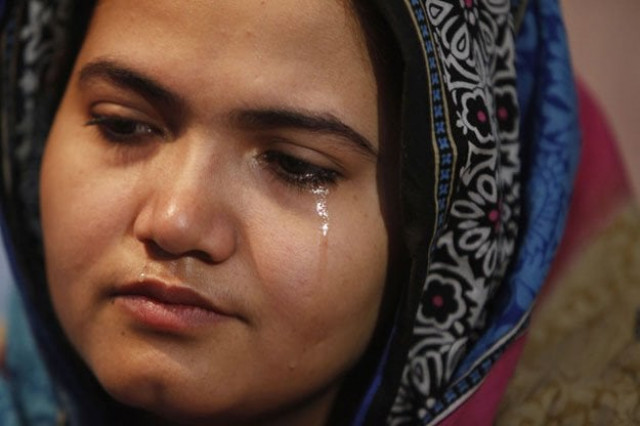The Pakistani women risking it all for their rights
Kainat Soomro has paid a high price for standing up against her rapists

In this photo taken on Jan. 26, 2016, Kainaat Soomro weeps during an interview with The Associated Press in Karachi, Pakistan. PHOTO: AP
Speaking to the Associated Press, Soomro narrated the horror of her captivity and the subsequent fight she has been waging. She has been to courts, held protests, rejected the rulings of the traditional jirga council, even taken on the powerful landlord and politician who she says are protecting her attackers.
Rawalpindi police book three for rape of deaf, mute woman
Despite all that, she has paid a high price for her standing up for herself. In 2010, her brother was killed because she wouldn’t stay quiet. As for her sister, one was divorced and another is still unmarried because people do not want to be associated with Soomro.
Ghulam Nabi Soomro, father of the rape victim, is outraged at the lack of progress in the case. "They know about our troubles thousands of miles away but here in the next street no-one is helping us get justice," he said.
Soomro’s battle for justice has inspired an award-winning 2014 movie, "Outlawed in Pakistan." Malala Yousafzai, the Pakistani teenage Nobel Peace Prize winner who was shot by the Taliban, invited Soomro to the Nobel award ceremony, and her fund has given Kainat financial help.
The independent Human Rights Commission of Pakistan recorded 423 rapes and 304 gang rapes last year. It also said that last year at least one woman a day was killed in the name of honour — murdered for allegedly bringing shame on the family. Attackers are rarely jailed with police often refusing to register a case.
"Each year a gamut of promises is made for the protection and development of women, but (they) remain unfulfilled by the year-end," the commission wrote in its 2014 annual report.
Bill aiming to ban child marriages shot down
Last month, the parliament refused to pass a law banning child marriage upon the advice of the Islamic Ideology Council, a religiously right-wing advisory group with no legal authority. The same body has also said that taking DNA tests to identify a suspected rapist is against Islam.
"Women's groups have been demanding that the Islamic Ideology Council be disbanded," says Uzma Noorani, an activist who also operates a women's shelter in Karachi.
She added that the fight for women’s rights has reaped some success, with the Sindh Assembly having passed legislation aimed at protecting women and banning underage marriages. However, she says the war begins anew as victims fight to convince police and judges to register cases and implement laws.
"When you have a law it is like a weapon, when you need it you can use it," says one outspoken member of Sindh's legislature, Mahtab Akbar Rashdi.
She said that the national government is pandering to those who adhere to a narrow and restrictive view of Islam, which mostly targets women. "It's as if women for them are the biggest problem in Islam," she said of the Islamic Ideology Council.
53% of teenage girls in Pakistan believe domestic violence is justified: report
One women's shelter in Karachi, surrounded by two walls and protected by guards, is home to around 40 women. Some have fled abusive husbands, some have been raped, others are being hunted down by families for choosing love.
One such woman is Azra who was sold to an older man by her family when she was 18-years-old. She ran away after he began passing her around to strangers and is now fighting for a divorce. Now 20, Azra is waiting for the court to decide her case.
Another such woman is Sidra Kanwal who left an abusive husband and moved back in with her mother. When another man proposed to her, she refused but he wouldn’t take no for an answer. He threw acid on her face so no one could have her.
Since she was so poor, doctors did not pay much attention to her. Her four-year-old son refused to come to her after her attack. "He didn't recognise me. My face scared him," she says, pulling her headscarf over her twisted mouth and nose.
When she went to court, Noorani, the women's rights activist, saw her and she received treatment. Her attacker is in jail now but society still hasn’t accepted her.
According to the Human Rights Commission, 55 acid attacks took place in Pakistan last year. To date, only 17 arrests have been made.
This article originally appeared on Daily Mail



















COMMENTS
Comments are moderated and generally will be posted if they are on-topic and not abusive.
For more information, please see our Comments FAQ